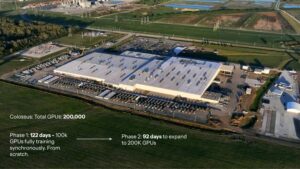AI factories should give EU startups access to supercomputers

OpenAI and Microsoft as well as a few other US startups dominate the scene, while up-and-coming European startups such as Mistral AI or Aleph Alpha are afraid of the upcoming EU regulation of the AI Act: The debate surrounding the EU falling behind further when it comes to artificial intelligence is behind them USA and China is in full swing. In this situation, the EU Commission is now making people sit up and take notice with a new plan: as part of a new package of measures, it would like to set up “AI factories” to support startups and SMEs in the development of trustworthy artificial intelligence.
AI is so Much More Than Just ChatGPT – and This Investor Proves it
How is that supposed to work? Mainly due to the change in the EuroHPC regulation. This dates back to 2021 and aimed to build high-performance computing capacities (HPC for short) in the EU. Now the EU Commission wants to make access to these AI-specific supercomputers easier for “a large number of public and private users, including startup companies and SMEs” by reforming this regulation. There will also be a central point of contact for startups and innovators to contact if they want access to these supercomputers.
What exactly can be imagined by these AI factories? “Today, we announce the launch of AI Factories, bringing together the ‘raw materials’ for AI: computing power, data, algorithms, and talent. They will serve as a one-stop shop for Europe’s AI start-ups, enabling them to develop the most advanced AI models and industrial applications. We are making Europe the best place in the world for trustworthy AI,” says EU Commissioner Thierry Breton, responsible for the internal market. Margrethe Vestager, Executive Vice-President of the EU Commission, also says that SMEs and start-up companies should have “privileged access to the network of European supercomputers”.
AI Factories: €4 billion in investments to be mobilized
But it is also clear that this plan will not work without fresh funds. That is why the AI factories are supported by additional financial support within the framework of Horizon Europe and the “Digital Europe” program for generative AI. “This package will generate additional public and private investments totaling around 4 billion euros by 2027,” says the EU Commission. That may sound like a lot of money, but compared to the financial resources that OpenAI alone provides (+10 billion US dollars), it’s not that much; especially because these investments will probably be spread across dozens or even hundreds of companies. Further risk capital for startups will also be mobilized through the EIC Accelerator program and the InvestEU program.
To get an idea of what these European supercomputers look like: LUMI in Kajaani, Finland, which is built and operated by HP and the IT Center for Science (CSC) there, achieves 539 petaflops at its peak. For comparison: The supercomputer from Meta Platforms, which has been being built together with chip giant Nvidia since 2022 under the project name AI Research SuperCluster (RSC) to train new AI models, achieves a peak of 1,895 petaflops. Finnish AI startup Silo AI already has access to LUMI and aims to create the largest open-source language model in the world.
These FLOPs (Floating Point Operations) are also legally relevant. The AI Act stipulates that the computing power used to train the AI models is considered to be a “systemic risk”. It is measured in so-called FLOPs. Anything above 10^25 FLOPs can be considered a “systemic risk”. 10^25 FLOPs are already in the yottaflops range, i.e. powers above the petaflops level.
The EU Commission’s initiative has not yet been implemented. The European Parliament and the Council will now examine the Commission’s proposed changes to the EuroHPC Regulation and are not required to approve them.






























